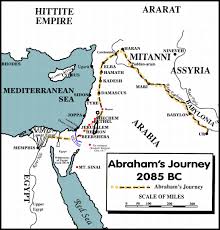 Abram is a descendant of Shem, apparently raised in Mesopotamia, the Sumerian culture . . . whether or not he lived the culture, he was influenced, and could choose either to embrace or reject it. (Genesis 11 speaks of his brother Haran dying in the land of his birth: Ur). Three interesting sites on Sumer: http://www.sjsu.edu/faculty/watkins/sumer.htm http://www.bibliotecapleyades.net/sumer_anunnaki/esp_sumer_annunaki04. http://www.theology.edu/sumer.htm
Abram is a descendant of Shem, apparently raised in Mesopotamia, the Sumerian culture . . . whether or not he lived the culture, he was influenced, and could choose either to embrace or reject it. (Genesis 11 speaks of his brother Haran dying in the land of his birth: Ur). Three interesting sites on Sumer: http://www.sjsu.edu/faculty/watkins/sumer.htm http://www.bibliotecapleyades.net/sumer_anunnaki/esp_sumer_annunaki04. http://www.theology.edu/sumer.htm
Abram was born 1946 years after the Fall, perhaps 2054 BC. The time period is classified as the Bronze Age by scientists. For an overview of the Bronze Age: http://en.wikipedia.org/wiki/Bronze_Age
If the Flood was about 2344 BC (when Noah was 600, 1656 years after the Fall), and Noah lived 350 years after the Flood (died 1994 BC?) Abram might have been 60 years old when Noah died. Genesis 11 says Shem lived 502 years after the Flood, which would put his death possibly 1844 BC, 35 years after Abram’s death. So it is possible that Abram knew these men/patriarchs and was directly influenced by them for the choices he made in life.
Abram was also born during the lifetime of Peleg, in whose time “the earth was divided”–so that (possibly the Tower of Babel) could have happened within 200 years of Abram’s birth, or sometime during his life.
Of course the record (Genesis 11) is unclear about just when Abram was born . . . by the time Terah was 70, all three of his known sons (Abram, Nahor, and Haran) had been born. It is my supposition, because Haran died earlier than his brothers, and Nahor at least (possibly also Abram) married his daughter, that Haran was born of a previous wife, probably born more like when Terah was about 30-35, as his progenitors had sons about then. Of course Terah might have had some other unnamed son then, but it seems to me to fit the pattern of those mentioned.
So Terah takes his son Abram and wife Sarai (already considered barren), and his grandson Lot (Haran’s son)–no mention of wife, but that doesn’t mean there wasn’t one–moved from Ur to Haran . . . intending to go to Canaan. They come to the city of Haran and stay there, perhaps distracted from their intent by the attractions of Haran. Maybe they called it Haran after Terah’s deceased son, or maybe Terah’s son was named for the city. Maybe Terah had lived there before. A clarification of the place name and the son’s name may be found at http://en.wikipedia.org/wiki/Haran_(biblical_place) and more on the place is at http://en.wikipedia.org/wiki/Harran. From these, it would appear that Terah’s other son Nahor, or his posterity, also migrated to Haran at some point. Another site: http://www.bibleplaces.com/haran.htm
Terah dies in Haran, age 205, according to Genesis 11:32. If Abram left Haran at age 75 (Genesis 12:4), there would be at least 130 year gap, if he didn’t leave until after his father died. If Abram was born when his father was 70 (Genesis 11:26), and left Haran age 75 as stated, his father lived in Haran another 60 years after Abram left.
Maybe Terah is distracted from his purpose, but the Lord doesn’t intend for Abram to be so, and tells Abram to leave his father’s house, his kindred and all, and get on down the road to Canaan. Already the Lord promises Abram he’ll be a great nation, God will bless him and he will be a blessing to others (in fact all the families of the earth), and his name will be famous. God will bless those that bless Abram, and curse those that curse his friend Abram.
Either Abram takes Lot along under his wing, or Lot decides to throw in with him. Although Lot is his nephew, it may be that they were of a similar age and good friends/brethren.
They take “all their substance that they had gathered, and the souls that they had gotten in Haran”–sounds like a lot. Their substance might have been money or goods, but was probably flocks/herds as later mentioned as their livelihood. Apparently they also had acquired servants or hired hands. Later Abram talks about his steward, Eliezer of Damascus (born in his “house”, and his heir?–Genesis 15:2-3–or were the steward and the heir different?). Head ’em up . . . move ’em out.
I liked all these maps for various reasons, though I don’t agree with everything they say . . . for instance, Abram may have been the youngest of the 3 sons. But he is mentioned first because he is our main character in the story. Similarly, Shem, Ham, and Japheth are not necessarily written in order of birth.






